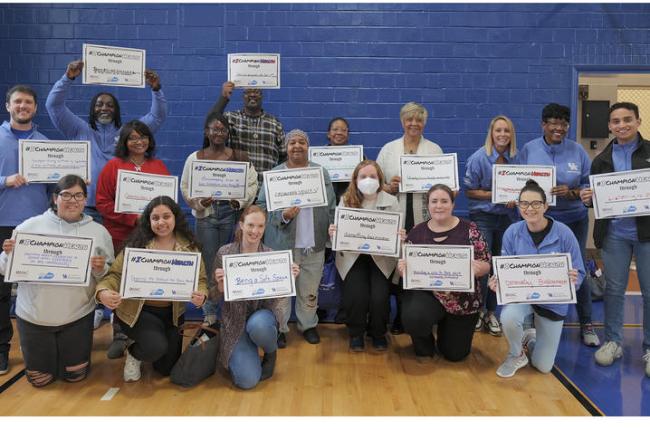New #IChampionHealth initiative targets improving health in Lexington
Through a University of Kentucky health-focused leadership program, youth and adults in Lexington’s east and west end communities have trained to become community health champions for the #IChampionHealth initiative.
The program is a partnership between the UK PREVENT Community-Engaged Alliance, Operation Making a Change and the United Way of the Bluegrass. The community members involved in the effort are integral to designing community-based health communication and health equity initiatives tailored to meet the needs of their neighbors.
“It is important to hear from and engage community members about what should be prioritized in their communities. Authentic community partnerships are critical to create opportunities that are of greatest interest to the communities they serve,” said Melinda Ickes, Ph.D., a professor of health promotion in the Department of Kinesiology and Health Promotion and assistant dean for research in the UK College of Education.
The initiative works to:
- understand community concerns and needs through listening sessions, surveys, engagement boards and more;
- deliver accurate health information through culturally relevant flyers, youth lessons and innovative media communications;
- bring together community organizations that provide accessible health and support services to underserved communities; and
- encourage and support informed decision-making, healthy behaviors and advocacy through programs and events.
During the past year, #IChampionHealth partners have collaborated on community listening sessions, hosting community events, developing social media campaigns on Facebook and Instagram and launching the #IChampionHealth Chats podcast. Developing school lessons that support informed decision-making and healthy behaviors through a creative arts lens was also an integral part of the initiative. Between the events and youth lessons, #IChampionHealth has connected with nearly 1,600 community members, sharing resources and services identified as important to the community.
“This initiative provided the opportunity to develop relationships with great people and organizations already doing impactful and passionate work within our area. We found that what the community cares about, and opportunities to support these interests, varies by neighborhood. A one-size-fits-all approach does not work, even in a mid-sized city like Lexington,” said Jakob Hester, program coordinator for #IChampionHealth.
This further reinforces how critical authentic community engagement is to support sustainable impacts, Hester said.
Most recently, the initiative hosted a free art showcase and resource fair at the Charles Young Center. It featured a variety of art focused on unity and health from the youth and adult #IChampionHealth community health champions. The event included 15 local community resources that showcased job opportunities, training programs and health services. More than 150 community members participated in the showcase and resource fair, with more than 25 pieces of community-led art shared between the gallery and live showcase, a mix of poetry, spoken word, music and visual art.
One outcome of the initiative, the #IChampionHealth Chats podcast, is dedicated to improving health through powerful stories and insights from community members. Four episodes are posted so far, highlighting leaders and volunteers behind local initiatives designed to serve communities and fill unmet needs. Episodes are available on Spotify, YouTube, Apple Podcasts and other podcast aggregators.
“Getting to know and highlighting community champions has been one of the most powerful and meaningful experiences,” Ickes said. “We are fortunate to have so many people in Lexington invested in their community. I am hopeful that this initiative continues to build bridges to work together, empower community voice and showcase these incredible communities.”
To contact #IChampionHealth representatives, email ichampionhealth@uky.edu.
The #IChampionHealth initiative was supported by funds made available by the Kentucky Department for Public Health’s Office of Health Equity from the Centers for Disease Control and Prevention, National Center for STLT Public Health Infrastructure and Workforce.
This project is supported by the Kentucky Department for Public Health’s Office of Health Equity, with funding from the Centers for Disease Control and Prevention (CDC) of the U.S. Department of Health and Human Services (HHS) and the National Center for STLT Public Health Infrastructure and Workforce as part of an award totaling $414,221 with 0% financed with non-governmental sources. The contents are those of the author(s) and do not necessarily represent the official views of, nor an endorsement, by CDC, HHS, or the U.S. Government. For more information, please visit CDC.gov.

